In a recent interview with the Sunday Mail here, Armed Forces Minister Luke Pollard raised concerns about the increasing threat posed by Russian activities near Scotland’s coastal waters, placing the region at the forefront of a new front in the West’s conflict with Russia.
Pollard revealed that Russian unmanned submarines are likely operating near Scotland’s shores, specifically targeting critical undersea infrastructure such as internet cables and offshore wind farms.
Pollard highlighted the importance of protecting these assets, saying, “We are very dependent on this infrastructure for our daily lives – the NHS is dependent on it, the financial markets are dependent on data flowing, the list goes on.”
He warned that Russia’s efforts to disrupt undersea communication networks could lead to significant economic damage. Referring to the 2022 incident off Shetland, where key communication lines were cut, Pollard noted that it was “almost certainly” an act of Russian sabotage, despite initial claims of a fishing accident.
“This is not an abstract threat,” Pollard continued, stressing the urgency of the situation. “If you are in a conflict with an aggressor who can attack those cables, you could sustain quite significant economic damage.”
In response to these emerging threats, the Ministry of Defence is increasing its investment in the protection of the UK’s subsea infrastructure. Pollard pointed to the commissioning of the Royal Fleet Auxiliary vessel Proteus, equipped with state-of-the-art technology to monitor and protect these vital assets.
Pollard acknowledged the changing nature of underwater warfare, noting, “That’s the changing face of warfare that we need to think about – underwater warfare with autonomous systems in particular.” He stressed that the UK must be prepared to deal with uncrewed underwater vehicles capable of covert operations. “We are not just talking about submarines with crews battling in the North Atlantic in a World War II context,” he added, alluding to the rise of autonomous technology.
Scotland’s strategic importance in national defence was also a key theme in Pollard’s remarks, for the full interview with Armed Forces Minister Luke Pollard, see the original article in the Sunday Mail.



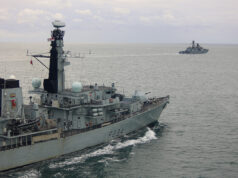
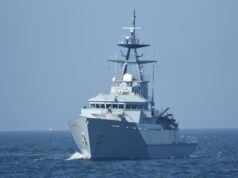
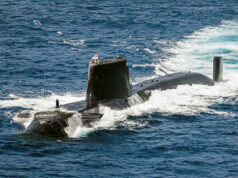
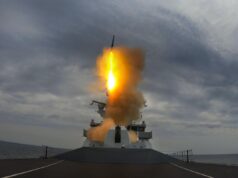
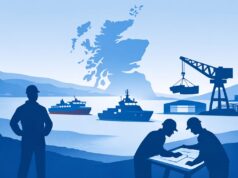


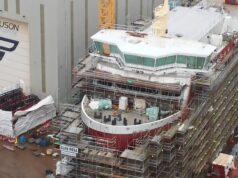
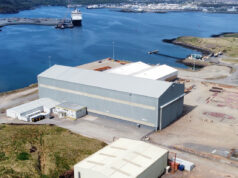

Interesting that Pollard is acknowledging the threat.
The previous government talked it down a bit…which I found odd.
I suspect Pollard has found some very worrying intel on his desk couple with ships in port and no assets to deal with this or even pretend to deal with it.
He points at Proteus, yet I read she’s not actually been used yet for the role she was acquired for. Is this true?
If it is, it’s the usual hot air and HMG are doing nothing.
The question is why she hasn’t been used?
I suspect two issues – system integration issues and crewing. But those are my guesses.
Given the current issues around pay for the RFA, it’s not surprising that they are having difficulty finding sufficient crew to man the vessels. Perhaps if some of the cash splurged on the train drivers had gone to fund realistic wages for the RFA, we might see the ships fully crewed and able to go to sea.
On that I totally agree with you.
There are loads of people applying to be train drivers. Not so much RFA.
Absolutely. Defence needs several upticks of priority and with Russia the aggressor always will. Their underwater capabilities for disruption should never be underestimated.
Think is the Russians are not bothered about deniability either
It’s because they know the west has a weakness and that is a political weakness..it’s not just the political classes it’s a top to bottom political weakness that our enemies think they can exploit and use to win ( especially the Chinese who believe in political warfare over everything else).
The West mostly has supported Ukraine which is something that has been demonstrated and committed too. And fighting back against the Houthis in the Gulf, that’s showed our intent. There maybe a weakness of sorts in the West because we are very diverse and broad in our values and freedoms which all fight for attention and place but if push comes to shove we seem to “find our fight” and become more unified.
The plan is to have 2 MROS Proteus ships, the second a purpose-built one due to be delivered in 2031 IIRC. Two in total means one at sea most of the time. One to cover thousands of square miles of our EEZ.
The undersea cables are concentrated in several areas, but one ship on the job is patently nowhere near enough, needs a class of 3 to even begin to scratch the surface.
What other vessels could detect UUVs? I assume a TAS would pick them up? Could a River operate a TAS? If so, it might be a useful capability pro tem, calling up a Poseidon to destroy it.
There is not much written about UUV capabilities, I wonder how other NATO partners are tackling the threat?
It all sounds a bit late. This ability is needed now or yesterday. The threats are live. If the Rivers are needed for other duties maybe build another class? The vessel the UK’s building for Ukraine, I think from the Protector class, can this be adapted? Or, offer to buy the two NZ Protector OPVs, both with hangars, currently tied up doing nothing in NZ? Maybe give NZ a good deal on some T31s and Wildcats?
I think a guy called John Blake said it best in his history of sea charts and surveys of the the seas around Britain
“The British Isles depend on the sea, but we who live here can suffer from sea-blindness, little realising how much our way of life is made possible through ships that bring goods and food, export our manufactured products, and provide the naval defence of our island.”
And the 21c has increased this dependence..our energy, our data and communications, food, raw materials, supply chain products and necessary goods all come from the sea, even the cloths on our backs. everything we have is completely reliant on both local control of our region seas and the ability to help protect key international sea lanes. But as the 20c developed we have as a nation become profoundly sea blind, this has only increased in the 21c..as our data and the information we consume seems to appear as by magic through the air.
Because of this sea blindness, what was once a massive geostrategic advantage, being an island cutting across the key sealanes feeding central and Northern Europe. May if we are not careful against become a key geostrategic weakness…
Britain was forced to the sea..we don’t have it in our blood, we became a maritime power as an answer to the overwhelming power of the European empires and restrictive economic policies designed so smother Britain. This occurred in the 16c…before then the British looked at the sea in fear and dread.
But during the 16c Britain became its best and greatest self because it fully embraced the sea and sea power in all its guises.
This was the case until 1945..the brutality of continental war, the risk of a war with the USSR and the needs of NATO have created a profound sea blindness..to the extent that the big impact the common man considers around defence cuts is not the size of the navy but how many soldiers we have…but in reality what has always matter to the geostrategic safety and welling being of the UK is sea power, be that under the ocean, on the surface of the ocean or in the sky above the ocean.
In reality the army is and alway has been a tool of foreign policy and influence, it’s import to have that and we need to offer a realistic and deployable expeditionary land force in support of stability and to back our allies, but sea power in all its forms is what defines and protects the British isles and we do need to remember that.
another quote I like from a very good paper:
“Britain needs to reconnect with key aspects of its distinctive maritime identity, to ensure that future generations will understand why the country took a different path to the adjacent continent, and how to build on that legacy.” Prof Andrew Lambert.
Maybe they should also be looking at a small fleet of diesel subs (join the Norwegian German sub program) to patrol the north and North Sea area and based on the East Coast? Needed now.
I’m looking forward to the increase in the number of Poseidon and the start of the new “Proteus”, preferably two. While we’re at it how about some small subs…Norway again maybe. We have a good relationship there and one we should foster.
We could definitely do with some smaĺler non-nuclear subs for Eastlant, as the high cost and therefore limited number of Astutes means we are well short of boats to handle even peacetime requirements.
The Astutes’ deployment pattern is not public knowledge. I would think at a guess we need to deploy 2 boats out of area in indo-pacific, one with the CASD Vanguard, one with the CSG. With 2 of the planned 7 in maintenance or refit, that leaves one for the North Atlantic and High North. That is patently not enough to handle the Russian submarine force, which we can expect would be unleashed on Atlantic shipping and no doubt cable-cutting.
We need to get back to having a hunter-killer submarine capability in the Atlantic, to intercept enemy subs at GIUK and hunt those already out in the Atlantic. It is a task for NATO, but there isn’t a big NATO sub force in northern waters.
The RN should cover the Iceland-Shetlands arc, leaving a Dutch-German-Danish sub squadron to cover the Shetlands-Norway arc and North Sea.
Our contribution should be 6 SSKs to provide the Western squadron, 4 operational and 2 in maintenance/refit, and the European Eastern squadron likewise.
There is a need though for some Astutes in Eastlant, particularly for ops in the High North and Barents Sea. Would need at least 3, which is likely 2 more than we can currently provide. We really need to add an extra Astute to the current construction programme, squeezed in before the first Dreadnought is completed.
In my book, by 2035, we should have 8 Astutes and the first 2 of 6 new SSKs. If we get a lift from 2% to 2.5% of GDP, this would be affordable. I think more submarines would be more valuable than increasing escorts beyond the 19 currently planned, at least up to 2035.
Astute costs £1.1 bn per boat I think, a capable SSK can be had for not much more than half that, if we avoid the expensive German and French offerings. Modern SSKs with lithium ion battery power are much quieter and stealthier than previous generations and represent good value for money.
Some reply, my friend!. My reply to you will be shorter because I agree with everything you say. Another Astute would be a great force multiplyer as we should be able to keep three or four active along the lines you mentioned.
The new T 212, the CD version, would fit the bill for an SSK and would have the benefit of commonality with the Norwegians in particular. I think I read that the price was at something like 650 million Euro.
Again on the escorts. I would call it quits on the T32 and order three, preferably five more T31’s now as a follow on batch. Likewise I wonder about the T83. Rather that going it alone there is again a possible link for a common ship, this time with Japan. I would love to spend money on our ships but I can’t see the cash being forthcoming anymore than it has been to date.